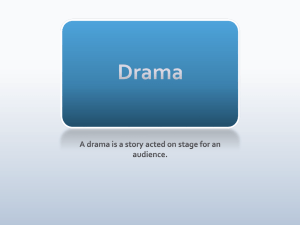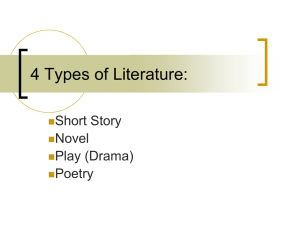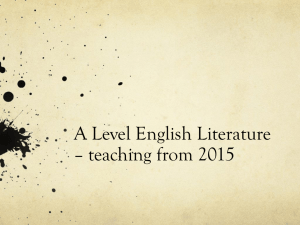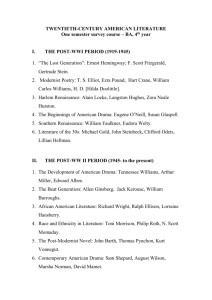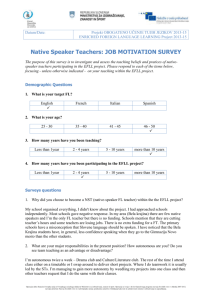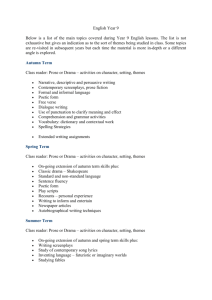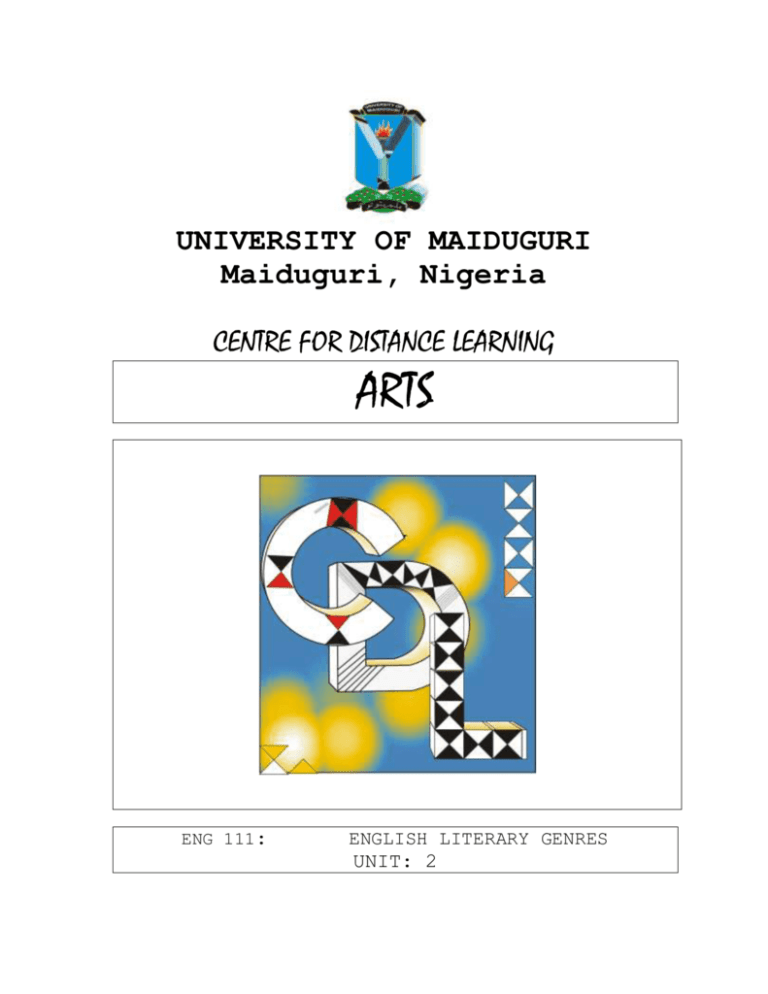
UNIVERSITY OF MAIDUGURI
Maiduguri, Nigeria
CENTRE FOR DISTANCE LEARNING
ARTS
ENG 111:
ENGLISH LITERARY GENRES
UNIT: 2
ENG 111 – ENGLISH LITERARY GENRES
UNIT: 2
Published 2007©
All rights reserved. No part of this work may be reproduced in any
form, by mimeograph or any other means without prior permission in
writing from the University of Maiduguri.
This text forms part of the learning package for the academic
programme of the Centre for Distance Learning, University of
Maiduguri.
Further enquiries should be directed to the:
Coordinator
Centre for Distance Learning
University of Maiduguri
P. M. B. 1069
Maiduguri, Nigeria.
This text is being published by the authority of the Senate, University
of Maiduguri, Maiduguri – Nigeria.
ISBN:
978-8133-73-8
ii
CDL, University of Maiduguri, Maiduguri
ENG 111 – ENGLISH LITERARY GENRES
UNIT: 2
PREFACE
This study unit has been prepared for learners so that they can do
most of the study on their own. The structure of the study unit is
different from that of conventional textbook. The course writers have
made efforts to make the study material rich enough but learners need
to do some extra reading for further enrichment of the knowledge
required.
The learners are expected to make best use of library facilities and
where feasible, use the Internet. References are provided to guide the
selection of reading materials required.
The University expresses its profound gratitude to our course writers
and editors for making this possible. Their efforts will no doubt help
in improving access to University education.
Professor J. D. Amin
Vice-Chancellor
iii
CDL, University of Maiduguri, Maiduguri
ENG 111 – ENGLISH LITERARY GENRES
UNIT: 2
HOW TO STUDY THE UNIT
You are welcome to this study Unit. The unit is arranged to
simplify your study. In each topic of the unit, we have introduction,
objectives, in-text, summary and self-assessment exercise.
The study unit should be 6-8 hours to complete. Tutors will be
available at designated contact centers for tutorial. The center expects
you to plan your work well. Should you wish to read further you could
supplement the study with more information from the list of
references and suggested readings available in the study unit.
PRACTICE EXERCISES/TESTS
1. Self-Assessment Exercises (SAES)
This is provided at the end of each topic. The exercise can help
you to assess whether or not you have actually studied and understood
the topic. Solutions to the exercises are provided at the end of the
study unit for you to assess yourself.
2. Tutor-Marked Assignment (TMA)
This is provided at the end of the study Unit. It is a form of
examination type questions for you to answer and send to the center.
You are expected to work on your own in responding to the
assignments. The TMA forms part of your continuous assessment
(C.A.) scores, which will be marked and returned to you. In addition,
you will also write an end of Semester Examination, which will be
added to your TMA scores.
Finally, the center wishes you success as you go through the
different units of your study.
iv
CDL, University of Maiduguri, Maiduguri
ENG 111 – ENGLISH LITERARY GENRES
UNIT: 2
INTRODUCTION TO THE COURSE
This course introduces students of Literature in English to
the various Literary Genres in Literature.
These three main
Literary Genres are:
Prose,
Drama and
Poetry
CDL, University of Maiduguri, Maiduguri
1
ENG 111 – ENGLISH LITERARY GENRES
UNIT: 2
ENG 111:
ENGLISH LITERARY GENRES
UNITS: 2
T A B L E O F C O N T E N TS
PAGES
PREFACE
HOW TO STUDY THE UNIT
INTRODUCTION TO THE COURSE
TOPIC
-
-
-
-
iii
iv
1
1:
INTRODUCTION TO LITERARY GENRES
-
- 3
2:
PROSE
-
-
-
-
-
-
- 6
3:
POETRY
-
-
-
-
-
-
- 10
4:
DRAMA
-
-
-
-
-
-
- 16
SOLUTION TO EXERCISES
CDL, University of Maiduguri, Maiduguri
2
ENG 111 – ENGLISH LITERARY GENRES
UNIT: 2
T O P I C 1:
TABLE OF CONTENTS
PAGES
1.0
TOPIC:
DEFINITION OF LITERATURE AND ITS
GENRES
-
-
-
-
-
3
1.1
INTRODUCTION -
-
-
-
-
-
-
4
1.2
OBJECTIVES
-
-
-
-
-
-
-
4
1.3
IN-TEXT
-
-
-
-
-
-
-
4
-
-
-
-
-
-
-
4
1.3.2 NON-FICTION
-
-
-
-
-
-
4
1.4
SUMMARY
-
-
-
-
-
-
4
1.5
SELF ASSESSMENT EXERCISE
-
-
-
-
4
1.6
REFERENCE
-
-
-
-
-
-
5
1.7
SUGGESTED READING
-
-
-
-
-
5
-
1.3.1 FICTION
-
-
CDL, University of Maiduguri, Maiduguri
3
ENG 111 – ENGLISH LITERARY GENRES
1.0
TOPIC: DEFINITION OF LITERATURE AND ITS GENRES
1.1
INTRODUCTION
UNIT: 2
Literature as a subject is divided into three main
categories namely prose, poetry and drama.
But before going into detail on the above mentioned
classifications, it is worthy of note that literature, whether
prose, poetry or drama falls into two major groups
commonly called fiction and non-fiction.
1.2
OBJECTIVES
At the end of the topic you should be able to:
i.
ii.
iii.
1.3
1.3.1
Define fictitious literature and non-fictitious
literature.
Describe the types of literature.
Define what is fiction and non-fiction
IN-TEXT
FICTION
This refers to work of arts that is not true to life. on the
other hand, it is an invented story, it is not based on facts. Such
stories emanated from the writers imagination and their
contents are false. One important feature of a fiction is that the
imagined story is liable to happen.
1.3.2
NON-FICTION
Non-fiction in just the opposite of fiction, they are true
stories that happened some times in our society, they are written
to educate and some times to expose societal ills. For a story to
be regarded as non-fiction, its facts have been studied,
experimented and proved correct.
1.4
SUMMARY
In this topic, various types of literature were discussed.
We also defined literature that is fiction, and literature
that is non-fiction.
CDL, University of Maiduguri, Maiduguri
4
ENG 111 – ENGLISH LITERARY GENRES
1.5
SELF-ASSESSMENT EXERCISE
1.
1.6
UNIT: 2
Discuss on the various types of literature.
REFERENCES
M. C .B. Moody, The Teaching of Literature, Longman:
London 1971.
O. J.
Abah “Drama as an Instrument of Human
Resources Development: Attah M. O. (Ed) The
Humanities and Human Resources Development: A
Book of Readings. University of Maiduguri. 1999.
Longman Dictionary of Contemporary English.
Edition. Longman, London. 1995.
1.7
New
SUGGESTED READINGS
Moody, M. C. B. The Teaching of Literature. Longman:
London, 1971.
Longman Dictionary of Contemporary English.
Edition.
New
Longmann. London. 1995.
CDL, University of Maiduguri, Maiduguri
5
ENG 111 – ENGLISH LITERARY GENRES
UNIT: 2
T O P I C 2:
TABLE OF CONTENTS
PAGES
2.0
TOPIC:
PROSE
-
-
-
-
-
-
6
2.1
INTRODUCTION -
-
-
-
-
-
-
7
2.2
OBJECTIVES-
-
-
-
-
-
-
-
7
2.3
IN-TEXT
-
-
-
-
-
-
-
7
2.3.1 NARRATIVE PROSE
-
-
-
-
-
7
2.3.2 SCIENTIFIC PROSE
-
-
-
-
-
7
-
-
-
-
7
-
-
-
-
8
8
-
2.3.3 EMOTIVE PROSE
2.3.4 TYPES OF NOVELS
-
2.3.4.1
ROMANTIC NOVELS
-
-
-
2.3.4.2
HISTORICAL NOVELS
-
-
8
2.3.4.3
SOCIOLOGICAL NOVELS
-
-
8
2.3.4.4
DIDACTIC NOVELS
-
-
-
9
2.3.5 ALLEGORY
-
-
-
-
-
-
9
-
-
-
-
-
9
-
-
-
9
-
-
-
-
9
-
-
-
-
9
2.4
SUMMARY
2.5
SELF-ASSESSMENT EXERCISES
2.6
REFERENCES
2.7
SUGGESTED READINGS
-
CDL, University of Maiduguri, Maiduguri
-
6
ENG 111 – ENGLISH LITERARY GENRES
2.0
TOPIC: PROSE
2.1
INTRODUCTION
UNIT: 2
Prose is simply the ordinary form of spoken or
written language without regular rhythmic or
metrical pattern.
To some people, it is a multiple story in a
passage form than specific central idea.
2.1
OBJECTIVES
At the end of the topic, you should be able to:
2.3
2.3.1
i.
Appreciate the various types of prose’s writings.
ii.
Learn how to differentiate among the various
types of prose writings.
iii.
iv.
Understand what prose writings are.
Define the various types of prose writings.
IN-TEXT
NARRATIVE PROSE
As the name implies, this is the type of prose that deals
with story telling it pays more attention in narrating how, when
where and why a particular thing happened. Most of its stories
came from biography and at times autobiography.
2.3.2
SCIENTIFIC PROSE
In this type of prose, attention is paid to
happened in an event rather than the event itself,
with up-to-date information of the event while the
led to such gathering and its description are
Example of scientific prose is politic and criticism.
2.3.3
things that
readers fed
factors that
abandoned.
EMOTIVE PROSE
This is the type of prose that leaves the state of thinking. It
persuade as the reader to share the predicaments disclosed in
the passage by taking. Most of the times, after going through
some novels you see yourself exhibiting joy, hatred, love or
CDL, University of Maiduguri, Maiduguri
7
ENG 111 – ENGLISH LITERARY GENRES
UNIT: 2
narrow. This is the effect of emotive prose – example of Emotive
prose in comedy and tragedy.
The prose story as hinted earlier is press –example of
Emotive prose is comedy and tragedy.
The prose story as hinted earlier is presented in Novels, it
in therefore necessary to know what a Novel is hence the
question….
A Novel is a long narrative fiction prose in which imaginary
characters are presented in a readable or true to manner.
The story is a novel reflection but true-to-life. The novel is
based on stories that can happen in real life are used though
such names do not connote any particular possession.
However, it is worthy to note that novels cannot be of the
name length. Some are very long and some are of longer length
than others in any case for at book to be called a novel, it should
be of such …… case road
2.3.4
TYPES OF NOVELS
There are as many novels as there are many stories. And
such of those novels presents a particular story in unique way.
Among others are:2.3.4.1 ROMANTIC NOVELS:
Romantic novels are those novels that treat
stories concerning love, affection and admiration. It
educates on love and problems associated with love
and sometimes expose human emotion in love, affairs.
Example of
Novels is “Pride and Prejudice” by Jane Austen.
2.3.4.2 HISTORICAL NOVELS
There are novels that deal with historical
events. It brings to focus the happenings of the old to
the general public for the purpose of adjusting and
correcting the present society. "A Tale of Two Cities”
by Charles Dickens is a typical example.
2.3.4.3
SOCIALOGICAL NOVELS
CDL, University of Maiduguri, Maiduguri
8
ENG 111 – ENGLISH LITERARY GENRES
UNIT: 2
This type of novel associates itself with social
event i.e. the events currently taking place in the
society. It attempts to equip the masses with the
recent happenings and save them the danger
associated with ignorance. Example of sociological
novel is “A man of the people” by Chinua Achebe
2.3.4.4
DIDACTIC NOVELS
There are novels that deal with moral conducts.
It specifically
2.3.5
ALLEGORY
This is a novel whose story uses idioms such as love,
pride, despair, weakness and hope as characters. These
ideas are personified and made to talk and behave like
human beings. The allegory is ironical but most often
satirical and carries a surface story with deeper meaning
on ………
2.4
SUMMARY
After studying this topic carefully, the student should be
able to easily understand what is prose and what are these
various types of novels.
2.5
SELF ASSESSMENT EXERCISES
1.
2.
3.
2.6
What is prose writing in literature?
Briefly discuss two types of prose writing.
Write short notes on at least two types of narrative
techniques.
REFERENCES
Moddy, H. L. B. The Teaching of Literature. Longman:
London. 1971.
2.7
SUGGESTED READING
Longman Dictionary of Contemporary English. New Edition.
Longman. London. 1995.
CDL, University of Maiduguri, Maiduguri
9
ENG 111 – ENGLISH LITERARY GENRES
UNIT: 2
T O P I C 3:
TABLE OF CONTENTS
PAGES
3.0
TOPIC:
POETRY
-
-
-
-
-
-
3.1
INTRODUCTION
3.2
OBJECTIVES
3.3
IN-TEXT
-
-
-
-
-
11
-
-
-
-
-
-
-
11
-
-
-
-
-
-
-
11
3.3.1 TYPES OF POEMS
-
-
-
-
-
11
3.3.2 NARRATIVE POEMS
-
-
-
-
-
12
3.3.3 THE EPIC
-
-
-
-
-
12
-
-
-
-
-
12
-
-
-
-
12
-
-
-
-
-
13
-
-
-
-
-
14
-
-
-
-
14
-
-
-
14
-
-
3.3.4 THE BALLARD
3.3.5 LYRICAL POEMS
3.3.6 THE ODE
-
3.3.7 THE ELEGY
-
-
10
3.4
SUMMARY
3.5
SELF ASSESSMENT EXERCISES
3.6
REFERENCES
-
-
-
-
-
-
14
3.7
SUGGESTED READING
-
-
-
-
-
15
CDL, University of Maiduguri, Maiduguri
10
ENG 111 – ENGLISH LITERARY GENRES
3.0
TOPIC: POETRY
3.1
INTRODUCTION
UNIT: 2
According to Villiah Cullen Bryant, poetry is that
which selects and arranges the symbols of thought in a
manner as to excite it powerfully and delightfully. Poetry
is an interpretation of life through imagination feelings
presented in simple rhythmic language (verse) metrical
pattern.
William Wordsworth in his own contribution defines
poetry as a spontaneous over flow of powerful feeling
recollected in tranquility.
However, many people believe that poetry produces
pleasure
and
present
emotional
and
intellectual
experiences of life.
In summary therefore, poetry writers agree that
poetry is an art, which arouses the reader’s emotion,
challenges his imagination, power and all his sensory
organs. It explores life and offers discipline through satire.
Its language is concrete and its aim is to gladden the hearts
of those who read it.
3.2
OBJECTIVES
At the end of this topic, you should be able to:
i.
Understand the various definitions of poetry.
ii.
Appreciate the role of poetry in society
iii. Discuss
understand.
iv.
3.3
why
poetry
seems
difficult
to
Differentiate among the various types of poetry.
IN-TEXT
After carefully studying through this topic, students
should be able to answer questions like; what is poetry?
The role of poetry in society. Difficulties encountered in
understanding poetry.
CDL, University of Maiduguri, Maiduguri
11
ENG 111 – ENGLISH LITERARY GENRES
3.3.1
UNIT: 2
TYPE OF POEMS
Poems are not classified according to their subject matters.
This is because a poet can write on any subject at all in the
universe, since the choice of topic by the poet is limit-less, it
would not be wise to classify poems classified according to the
manner in which the topic has been presented. The following
are the classification and types of poems:
3.3.2
NARRATIVE POEMS
Narrative poems are poems that tell stories. The story in
the poem is seriously told. At times it appears humorous and
fearful. However, narrative poetry are told in continuous verse
and at times divided into stanzas. It is simply divided into two
types. These are the epic and the Ballard.
3.3.3
THE EPIC
Epic is a long narrative poem which tell of the adventure
and noble deeds of a hero as we have already known hero is a
person who done great and good things for his community. The
subject matter of the epic is always serious and the story is
seriously to (a). The hero sometimes faces severe hardship but
after a great struggle overcomes the problems and wins victory
or achieves his aims.
3.3.4 THE BALLARD
The ballard is a short and simply narrative poem ballards
are mostly written about any experience in life. The main
difference is that the ballard is short and simple and does not
tell the story of a particular hero while the epic is long, serious
and tells the story of a hero. The language of a ballard in a time
and the story is presented through narration, dialogue and
description.
3.3.5
LYRICAL POEMS
A lyrical poem expresses the thoughts and feelings of poet
about a particular subject or topic. Unlike the “narrative poet
does not tell a story. In lyrical, something stimulates the
CDL, University of Maiduguri, Maiduguri
12
ENG 111 – ENGLISH LITERARY GENRES
UNIT: 2
feelings or emotions of the poet. He says what he thinks about it
and draws his conclusions.
A lyrical poem could be written on any thing at all. It
could be life, kindness, an animal, a river or religion. The poet
site down and thinks deeply about a topic and expresses his
thoughts on it. A lyrical poet put every part of himself, his
personality, his judgment, his mode and his thought in action
while writing the poem. He may treat his subject mournfully or
happily. This means that the tone of a lyrical poem could be
serious or lighthearted depending on the mood of the writer.
The commonest type of lyrical poems is the Ode and the
Elegy.
3.3.5.1 THE ODE
The Ode is a serious lyrical poem in which the
poet expresses his thoughts and feelings on a given
topic. It could be written on any subject at all. The
subject matter is always serious and the poet presents
it in a serious dignified style.
3.3.5.2 THE ELEGY
The Elegy is a serious lyrical poem written to
mourn the death of a person or people in general.
Elegy can also be called Dirge. Students should not be
confused with these two names because the two
means the same thing.
Poems are not classified according to their subject matters.
This in because a poet can write on any subject at all in the
universe, since the choice of topic by the poet in limit-less, it
would not be wise to classify poems by their subject matters.
Base on this background poems a classified according to the
manner in which the topic has been presented. The following
are the classification and types of poems:
3.3.6
WHY POETRY IN SCHOOLS?
Poetry as part of literature is thought in line prose and
drama. For students to call himself a literature scholar, he must
CDL, University of Maiduguri, Maiduguri
13
ENG 111 – ENGLISH LITERARY GENRES
UNIT: 2
have the knowledge of poetry. Besides, poetry offers numerous
advantages to its reader. These advantages include:
(a)
(b)
(c)
(d)
(e)
(f)
3.3.7
Poetry helps us to develop our imaginary senses.
It imbibes in us the skill of creativity.
The knowledge of poetry awakens our emotional skill.
One with poetry skill see thing from the right
perception.
It helps us to develop our reasoning faculty.
The choice of words is harassed through poetry.
WHY POETRY SEEMS DIFFICULT TO UNDERSTAND
Research from nooks and cranny revealed that students
found it difficult to analysis and comprehend poems. A good
number of reasons are responsible for this. These reasons
include:(i)
MEANING
Students found it difficult to give the meanings of
poems. This is because a poet may write from a
background different from that of the reader. As a
result, many interpretations could be given to a
particular poem.
(ii)
DIFFICULT WORDS
Sometimes, a poet uses words, which the reader finds
difficult to understand. This is so because a poet is
free to make use of words that will enable him to
express his inner mind.
(ii)
EXOTICE STYLE
A poet may adopt a style which is foreign or unusual
to the readers and this will cause a problem in the
understanding of the poem.
3.4
SUMMARY
CDL, University of Maiduguri, Maiduguri
14
ENG 111 – ENGLISH LITERARY GENRES
UNIT: 2
In this topic, various definitions of poetry are discussed. It
also dwelt on the various types of poetry and their special
characteristics.
3.5
SELF-ASSESSMENT EXERCISES
1.
2.
3.
3.6
How do you define poetry?
Discuss briefly on the various types of poetry.
Why is poetry difficult to understand sometimes
REFERENCES
Jonathan Culler, Literary Theory: Oxford University of
Press: New York. 1997.
Berth Lindfors. Critical Perspectives: Three Continents
Press Washington D.C. 1975.
3.7
SUGGESTED READING
King, Bruce (ed) Introduction to Nigerian Literature. Lagos,
University Moddy, A. L. R. The Teacher of Lagos and Evans
Brothers, 1974.
Moddy, A. L. R. The Teaching of Literature Longman:
London 1971.
CDL, University of Maiduguri, Maiduguri
15
ENG 111 – ENGLISH LITERARY GENRES
UNIT: 2
T O P I C 4:
TABLE OF CONTENTS
PAGES
4.0
TOPIC:
4.1
DRAMA
-
-
-
-
-
-
INTRODUCTION
-
-
-
-
-
17
4.2
OBJECTIVES
-
-
-
-
-
-
17
4.3
IN-TEXT
-
-
-
-
-
-
18
-
-
-
-
18
-
-
-
-
-
18
-
-
-
-
-
18
-
-
-
-
18
4.3.5 TERMS ASSOCIATED WITH DRAMA
-
19
4.3.6 IMPORTANCE OF SPEECH IN DRAMA -
-
22
4.3.7 COMMON TERMS IN LITERATURE
-
22
-
4.3.1 TYPES OF DRAMA
4.3.2 MELODRAMA
4.3.3 FARCE
-
4.3.4 HISTORICAL PLAYS
4.4
SUMMARY
-
-
4.5
SELF-ASSESSMENT EXERCISES
4.6
REFERENCES
4.7
SUGGESTED READINGS
-
CDL, University of Maiduguri, Maiduguri
-
-
-
16
-
-
23
-
-
-
23
-
-
-
-
24
-
-
-
-
24
16
ENG 111 – ENGLISH LITERARY GENRES
4.0
TOPIC: DRAMA
4.1
INTRODUCTION
UNIT: 2
Drama is the work of arts designed for stage purposes. It is
also a story written to be performed on the stage. Drama may
be written in prose of verse form. It is however divided in acts
and scenes.
IS THERE ANY NEED FOR DRAMA?
So many people especially science scholars have asked this
questions numbers without time. It is essential to bring to the
knowledge of the public through this book that Drama play
prominent role in the life of people, society and country
respectively.
To start with, we are aware that a country is made up of
various ethnic groups, each ethnic group has its own culture, and
these cultures are brought to the notice of the world through
drama.
Apart from the above mentioned points, drama entertains.
How do you feels when sitting in a beer parlour with your legs
crossed and a bottle of drink at hand watching a thrilling drama
in a screen. Without been told, you simply forget your problems
for the moment and cheer with others around you.
Other benefits or drama include;(a)
(b)
(c)
(d)
(e)
(f)
(g)
4.2
Drama as part of literature helps people to eliminate
earthly-worries.
It keeps the body of those involved in it healthy and
good-looking.
Drama retreat wandering and aimless movement of
people.
It serves as a monitor of conduct.
Societal ills are revealed through drama.
It adds colour to promotion
It restrains the mind from thinking.
OBJECTIVES
CDL, University of Maiduguri, Maiduguri
17
ENG 111 – ENGLISH LITERARY GENRES
UNIT: 2
This section is designed in such a way that, the student
would be able to:
i.
4.3
Understand what drama is, as a literary genre.
IN-TEXT
At the end of the programme, students should be able to
recognize the various types of dramatically sub-genres and
appreciate them as part of the over-all genres of literature in
English.
4.3.1
TYPE OF DRAMA OR PLAY
There are so many types of drama or play but for the
purpose of examination we are going to consider the most
important ones among them. These are melodrama, farce and
historical plays.
4.3.2
MELODRAMA
A melodrama is a play which often has music interposed or
accompanying the actions. It has good and bad characters. Such
characters may be demons, ghosts, and other supernatural
forces. It is sensational and romantic. The play has events and
scene that cause tension and fear. The scenes are stage in
gloomy castle and secret passages. In spite of creating fear and
tension however, a melodrama ends happily. It is important to
note that a melodrama is an exaggerated and unrealistic story.
4.3.3
FARCE
A farce is an exaggerated comical play full of foolish and
unreasonable human characters. The main aim of a farce is to
induce laughter. To achieve this aim, it includes improbable
plots, and crude jokes.
The play is full of exaggerated
buffoonery with the actors wearing shabby cloths or appearing
on painted faces. Though a farce is humorous and full of comic
events, it is not a comedy because the events, and actions are
exaggerated, unrealistic and not true to life.
CDL, University of Maiduguri, Maiduguri
18
ENG 111 – ENGLISH LITERARY GENRES
4.3.4
UNIT: 2
HISTORICAL PLAYS
A historical play is a play that takes its plot or material
from historical records. It dramatizes great events that took
place in the olden days. Shakespeare’s historical plays dramatize
the life of English Kings and other Military leaders.
4.3.5
TERMS ASSOCIATED WITH DRAMA
(i)
ACTOR
An actor is the male leading character in a play,
drama or film. He is strong, brave and wise and
always, he fights for the interest of his community. It
is through him that the message of the play writer is
conveyed to his readers. The actor often suffers much
in the pursuit of his objectives but successes at last.
(ii)
ACTRESS
Unlike the actor, an actress is the female leading
character. She plays the role of the actor; the only
difference between her and the actor is that the actor
is a man while she is a woman.
(iii)
DRAMATIST
Dramatist is a name given to a person that acts a
play or drama. For one to answer a dramatist, he
most has acted in more than a play and has the zeal to
act more plays in time to come.
(iv)
PLAY WRIGHT
A play writer is a person that specializes in
writing of dramas and plays. Some play writers are
dramatist while majority are not. A good example of
a Nigeria play writer is Wole Soyinka.
(v)
SCRIPT
Script simply means the manuscript of a play of
drama. It is an exercise book where the play writer
put down the message of the drama. It is from the
CDL, University of Maiduguri, Maiduguri
19
ENG 111 – ENGLISH LITERARY GENRES
UNIT: 2
manuscript that characters know their role in the
play.
(vi)
REHEARSAL
Rehearsal is the constant practice of a drama in
a secret place before showing it publicly. It is
necessary because the characters must be acquainted
with the drama least they act something different
from the script thereby defeating the aim of the play
writer.
(vii)
COSTUME
Costume is a special name given to cloths, shoes
and make-ups used in the drama.
Most often,
costumes are hired from boutiques. The choice of
costume depends on the type of drama. If the drama is
dealing with wealth, the costume must be the
expensive type that will disclose riches at a glance.
(viii)
STAGE
A stage is a place where drama is performed. It
could be a room or an open place. However, it should
be noted that a stage is not permanent. The choice of
a stage depends on the target viewers and the
purpose attached to the drama.
(ix)
THEATER
A theater is a permanent place meant for the
exhibition of drama, plays, films and ethnic cultures.
It is wide and attractive in structure and contains
thousands of people. Example of a theater in Nigeria
is the National Theater Iganmu Lagos and the Open
Air Theater Maiduguri, Borno State.
(x)
VIEWERS
A viewer is a person who sees to the theater to
watch a play. A play as we all know is meant to be
watched, that is why it is performed in public places
like the theater so people who went to the theater for
the purpose of watching play are called viewers
CDL, University of Maiduguri, Maiduguri
20
ENG 111 – ENGLISH LITERARY GENRES
(xi)
UNIT: 2
CRISIS
Crisis in a play is a point at which the opposing
forces that make the conflict join together and help to
decide the direction at which the plot will turn. The
protagonist or leading character is faced with
alternative decisions, which will influence his fate.
(xii)
CONFLICT
Conflict is the struggle, which out of the
interplay of two opposing forces in a plot. Conflict
however provides suspense and interest in the play.
It is divided into two external conflict and internal
conflict.
Internal conflicts refer to the trouble
created by one’s mind while external conflict refers to
the problem of the two characters in the play.
(xiii)
NOUVEMENT
In a literary work, it is the period when the plot
is made clear, i.e. all the complications in the plot are
resolved.
The mystery in the play or story is
understood. Besides, an explanation to the secret and
misunderstanding in the play is made known.
(xiv)
COMIC RELIEF
This is a humorous scene, incident or speech in
the process of a serious play.
This device is
introduced by play writers to provide relief from the
emotional tension and to high to the seriousness of
the play.
(xvi)
A CLOWN OR JESTER
A clown in a character whose duty is to make or
crack jokes that will amuse others.
He is the
character that provides comic relief in the play.
Marcus in Taboo is an example.
(xvii)
SPEECH
Speech in a play refers to how the characters
talk. The characters in a play talk in different ways.
Some of the commonest speeches are soliloquy, aside,
Whisper, Duologue and Dialogue.
CDL, University of Maiduguri, Maiduguri
21
ENG 111 – ENGLISH LITERARY GENRES
(xvii)
UNIT: 2
SOLILOGUY
This is a speech made by a character when alone
on the stage. He either comes to the stage alone or
with other characters but remains there while the
other go away. In soliloquy, the character speaks out
his mind. He says aloud to himself what he is thinking
in his mind. The viewers heard him though the
speech is not meant for them. The soliloquy reveals
either the secret past deeds of the character or the
secret future plans he has. Sometimes, a soliloquy
gives information about other characters in the play.
(xix)
ASIDE
Aside is a brief comment made by a character
when conversation is going on at a particular moment
on the stage. Aside is spoken on a low voice and is
directed to the audience. It conveys some hidden
information about other characters to the viewers. It
equally adds to the comic or tragic effect of the play.
(xx)
WHISPER
A whisper is a low speech directed to the ear of
one character by a follow character on the stage. It is
meant for one character and cannot be heard by other
characters or audience. Whisper is used to give
corrections on the stage and sometimes to conspire.
(xxi)
DIALOGUE
Dialogue is a peaceful conversation between two
characters in a play. The two characters may be
enemies right from the beginning of the play but later
decided to reconcile.
4.3.6
IMPORTANCE OF CONVERSATIONS IN DRAMA
Conversation is important in drama for the following
reasons:
(a)
It is used to convey information about characters.
CDL, University of Maiduguri, Maiduguri
22
ENG 111 – ENGLISH LITERARY GENRES
(b)
(c)
(d)
(e)
UNIT: 2
Through conversation we get to know the behaviour of a
particular character, whether foolish, wicked or wise.
Conversations enable us to know more about the plot.
Some of the actions which cannot be presented physically
on the stage are revealed through conversation.
Conversation helps us to know what has happened in the
past and what will happen next.
4.3.7
COMMON TERMS IN LITERATURE
1.
SUSPENCE
Suspense is the figure of speech used to arouse the
curiosity of the readers. It is used to incite interest in the
minds of the readers and induce them to read or watch till
the end.
2.
FLASH BACK
Flash back is the inclusion of past stories to explain the
present one. It enables us to know the background of a
characters or the origin of a story or play.
3.
DICTION
Diction refers to the choice of words in literature. Some
literary writers choose modern words, others choose
ancient type. The choice of words makes a particular work
ease or hard to understand. So the choice of words and its
arrangement in literature is known as diction.
4.
DENOTATION
Denotation simply means the dictionary or primary
meaning of words in the passage. When a writer chooses a
word that connotes its ordinary meaning, he is making use
of denotation.
5.
CONNOTATION
Connotation is the opposite of denotation. It is the use of
words in symbolic form. On the other hand, it is the
application of words that mean something else. Again it is
the use of words that mean something literarily and on a
close observation mean something else.
CDL, University of Maiduguri, Maiduguri
23
ENG 111 – ENGLISH LITERARY GENRES
6.
UNIT: 2
ALLUSION
Allusion means reference. Reference on the other hand
means research embarked by the writer before writing his
work.
4.4
SUMMARY
This section examines what is drama, as a literary
genre. It also gives examples of some dramatic sub-genres.
4.5
SELF-ASSESSMENT EXERCISES
1.
2.
4.6
Describe the various types of drama.
Define the term drama.
REFERENCES
Berth Lindfors: Critical Perspectives: Three Continents
Press: Washington D.C. 1997.
J. O. Abah. “Drama as an Instrument of Human Resources
Development: Attah M. O. (Ed) The Humanities and Human
Resources Development: A Book of Readings. University of
Maiduguri. 1999.
4.7
SUGGESTED READINGS
Etherton, Michael. The Development of African Drama.
London. Hutchinson University library, 1982.
Abah, O. J. “Drama as an Instrument of Human Resources
Development”. Attah M. O. (Ed), The Humanities and
Human Resources Development: A Book of Readings.
University of Maiduguri, 1999.
CDL, University of Maiduguri, Maiduguri
24
ENG 111 – ENGLISH LITERARY GENRES
UNIT: 2
SOLUTION TO EXERCISES
TOPIC 1
1.
2.
There are three broad types of literature, namely: prose,
poetry and drama. Prose usually takes the form of a long
essay, using everyday language, but also containing some
literary devices that enhance its quality and message.
Poetry makes use of special language, manipulates words
and conforms to some strict literary techniques that make
it unique. While drama is usually set in form of a play,
normally put on stage, using actors, as characters.
Fictitious literature is usually written using fictitious
characters, where the writer uses his creative imagination
to depict a given society. While non-fiction literature
actually re-enacts events or situations that have taken
place in real life.
TOPIC 2
1.
2.
3.
Prose writing in literature is usually characterized by the
use of straight forward language, that is also takes the
form of a long essay. It also contains some literary devices
that enhance its quality and message.
Narrative prose, as the name implies, is the type of prose
that deals with story telling. It pays more attention in
narrating how, when, where, and why particular things
happened. While scientific prose pays attention to things
that happened in an event, rather than the event itself.
Some novelists present their story through letters. This
happens when there is exchange of letters between
different characters in the book.
Another way of
presenting a story is through conversation, that is when
two or more character talks to each other in the book.
TOPIC 3
1.
Poetry, simply put, is the ability of the literary artist to
manipulate words, and use certain poetic devices, in order
to create a poetic literary material that lives up to the
requirements of the genre
CDL, University of Maiduguri, Maiduguri
25
ENG 111 – ENGLISH LITERARY GENRES
2.
3.
UNIT: 2
Among the various types of poetry, we have the Ode and
Lyric poems. Ode poems are usually love poems that
celebrate the poet’s feelings for things close to his heart.
While lyric poems are usually read and accompanied with
music.
Poetry is difficult to understand because the poet normally
manipulates and twists words to achieve his stated goals.
As such, words are used in such a way that they sometimes
convey different meanings from what they actually are.
Also, poetic sentences are also written in such a way that
they don’t conform to ordinary everyday usage.
TOPIC 4
1.
2.
Drama one of the genres of literature, which is basically
designed to be performed. In other, words, it is a recreation of real life. According to Aristotle, drama is “the
initiation of an action”. It involves language in form of
action. A melodrama is a play which has music interposed
or accompanying the actions. A farce is an exaggerated
comical play full of foolish and unreasonable characters. A
historical play is a play that takes its plot from historical
records.
Drama is the work of arts designed for stage purposes. It is
also a story written to be performed on the stage. Drama
may be written in prose or verse form. It is however
divided in acts and sequences.
Drama plays a very
prominent role in the life of people, society and country
respectively.
Drama highlights the cultural values of
societies and exposes them to the notice of the world.
Drama also entertains its audience through the use of
songs, spectacles and dance.
CDL, University of Maiduguri, Maiduguri
26
ENG 111 – ENGLISH LITERARY GENRES
UNIT: 2
TUTOR MARKED ASSIGNMENTS
1.
2
Define literature and discuss in detail, factors
that contributed to the development of English
literary genres.
Discuss on any two types of novels.
3
What are some of the factors that make poetry
difficult to understand?
4.
Explain at least three common features of
drama.
Examine some literary terms and show how they
could be used in literary development.
5.
CDL, University of Maiduguri, Maiduguri
27



